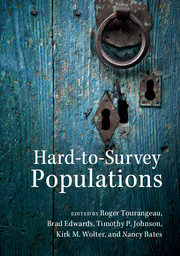Book contents
- Frontmatter
- Dedication
- Contents
- List of figures
- List of tables
- List of boxes
- List of contributors
- Preface
- Part I Introduction
- Part II Conducting surveys in difficult settings
- Part III Conducting surveys with special populations
- 11 Representing the populations: what general social surveys can learn from surveys among specific groups
- 12 Surveying cultural and linguistic minorities
- 13 Challenges to surveying immigrants
- 14 Ethnographic evaluations on coverage of hard-to-count minorities in US decennial censuses
- 15 Methodological and ethical issues arising in carrying out research with children and young people
- 16 Challenges in the first ever national survey of people with intellectual disabilities
- 17 Conducting research on vulnerable and stigmatized populations
- 18 Surveying political extremists
- Part IV Sampling strategies for the hard to survey
- Part V Data collection strategies for the hard to survey
- Index
- References
15 - Methodological and ethical issues arising in carrying out research with children and young people
Published online by Cambridge University Press: 05 September 2014
- Frontmatter
- Dedication
- Contents
- List of figures
- List of tables
- List of boxes
- List of contributors
- Preface
- Part I Introduction
- Part II Conducting surveys in difficult settings
- Part III Conducting surveys with special populations
- 11 Representing the populations: what general social surveys can learn from surveys among specific groups
- 12 Surveying cultural and linguistic minorities
- 13 Challenges to surveying immigrants
- 14 Ethnographic evaluations on coverage of hard-to-count minorities in US decennial censuses
- 15 Methodological and ethical issues arising in carrying out research with children and young people
- 16 Challenges in the first ever national survey of people with intellectual disabilities
- 17 Conducting research on vulnerable and stigmatized populations
- 18 Surveying political extremists
- Part IV Sampling strategies for the hard to survey
- Part V Data collection strategies for the hard to survey
- Index
- References
Summary
Introduction and background
This chapter draws on key issues emerging from a National Children’s Research Programme (NCRP) to identify methodological, practical, and ethical challenges when designing and implementing research studies with, and about, children and young people. The chapter commences with a brief overview of the NCRP with a summary of the key studies referred to in this chapter presented in the Appendix. More than sixty studies were carried out under the NCRP across areas of children’s lives as diverse as their outcomes (including, for example, health, education, and safety), their relationships (for example, with their peers, families, and others), and services (for example, universal, targeted, and more intensive supports). Consequently, it is possible to draw out learning across multiple methodologies, methods, and analyses, and highlight challenges arising across several aspects of study design and implementation. The chapter is illustrative rather than comprehensive and focuses on those studies that best exemplify issues arising.
The overview is followed by issues in study design, including challenges in ensuring meaningful participation by children and young people, tensions arising between protection of children and their participation, issues arising in consent, assent and re-consent, and a consideration of confidentiality, anonymity, and privacy in the context of children’s research. Challenges in study implementation are focused around areas such as sampling and recruitment, data collection, data analysis, and dissemination. The chapter concludes that while research with, and about, children raises challenges over and above that with adults, these can be overcome with appropriate consideration. The examples presented in this chapter can provide practical guidance in these areas.
- Type
- Chapter
- Information
- Hard-to-Survey Populations , pp. 316 - 346Publisher: Cambridge University PressPrint publication year: 2014
References
- 1
- Cited by



